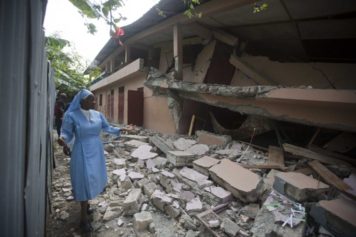Haiti’s electoral council announced on Tuesday a new calendar for the holding of a crucial legislative ballot in July, while presidential and local elections are scheduled to take place later this year in the Caribbean country, where a two-day general strike has just ended.
The nine-member electoral council, tasked with organizing a series of elections this year, said the first round for the legislative elections (for 20 senators and the entire Lower Chamber) would take place in July.
The second round of the legislative elections would be held at the same time as the first round of the presidential election on October 25, while the runoff for the presidential voting would be organized in January 2016.
“We are very pleased to communicate this calendar which has been the object of deep reflection on the part of the council,” Yolette Mengual, a member of the council, told HCNN on Tuesday.
“We are working very actively to organize free, fair, transparent, democratic and inclusive elections in Haiti,” Mengual told HCNN.
The schedule has been proposed by the electoral council, but the proposed schedule won’t be official until it is published by presidential executive order.
The president of the council, Pierre-Louis Opont, announced that the electoral process will be truly launched in March and that several missions will be sent throughout the country to assess and make functional the regional electoral bureaus that will play an important role in the organization of the elections.
Opont told reporters on Tuesday that the proposed schedule and a draft electoral decree have been communicated to political parties for comment, before being submitted on Friday to the Haitian President Michel Martelly, who has the constitutional prerogative to publish it in the nation’s official gazette “Le Moniteur.”
The announcement has been made at a time when street demonstrations and general strikes have been organized by opposition hardliners, who continue to demand the resignation of the country’s leader before the holding of any election.
A two-day general strike to demand a more significant reduction in gas prices and the early departure of Martelly, ended on Tuesday.
“The successful two-day strike was a referendum that proves that the current administration has no legitimacy to continue to govern the country,” said Turneb Delpe, a spokesman for radical opposition groups, in a declaration read to reporters on Tuesday.
“After the street demonstrations and the successful two-day strike, we call on president Martelly to resign in order to avoid a more catastrophic situation to the country,” Delpe stated.
However, the spokesman for Martelly, Lucien Jura, accused the opposition groups that organized the strike of having taken hostage the population that was forced to stay home.
“We cannot speak about successful strike when you threaten people and force them to stay home when you create an atmosphere of terror, block roads with barricades, set vehicles on fire, throw rocks at people who wish to go about their businesses,” Jura told HCNN.
“When you spread messages calling on parents to write the names of their children under their feet if they dare send them to school, so that they may recognize them (their bodies), what do you want them to do?” wondered Jura.
Several cars had been burned in the capital as a result of the opposition movement; an excavator owned by the Haitian department of public works has also been set on fire on Tuesday in the northern town of Cap Haitien.
However, organizers of anti-government protests repeatedly said that their movement remained peaceful and have denied any involvement in the acts of violence.
Source: Caribbean News Now


